Coconut oil has become one of the most popular products when it comes to body, skin and hair health. Recipes suggest that it be applied to the face, others call for it to be spread on the hair strands. There are also those who believe that it is the best option when preparing a food that needs oil to finish.
As its name suggests, coconut oil is a vegetable oil produced from the pulp of the coconut. In this way, it can be used in cosmetics or in culinary dishes. These are, in fact, the most widespread uses of paradise fruit oil. But what are the functions of the product in these two utilities? Check out!
Benefits of coconut oil in cooking
The use of coconut oil in cooking stands out as an alternative to other types of oil, both vegetable and animal. Understand what benefits it can bring from your food.
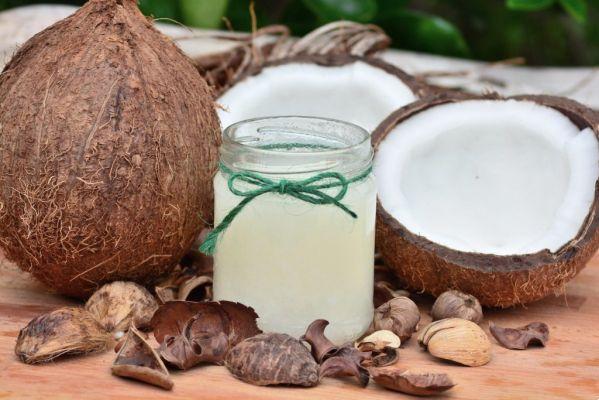
1) Strengthening the body
The structure of coconut oil has the following components: triglycerides (which turn into monolaurin in the stomach) and fat-soluble vitamins (which dissolve in fat). Monolaurin acts as an antibacterial, antifungal and antiviral, improving the body's immunity. At the same time, fat-soluble vitamins favor HDL (good cholesterol) levels and reduce LDL (bad cholesterol) levels.
2) Diversity of combinations
One advantage of coconut oil is that it goes well with hot, cold, savory and sweet foods. At the same time that it can be used in salads and vegetables, it is also an option when sautéing food or cooking rice and proteins, for example. In addition, it can be used to enhance fruit salads, smoothies and drinks, without overdoing it.
3) Replacement of other oils
Conventional vegetable and animal oils, when heated, oxidize and lose part of their nutritional qualities. As coconut oil has medium chain triglycerides, high temperatures do not compromise the chemical structure of the product and maintain its beneficial properties for the body. Thus, it can even be used to grill food, without losing nutrients.

4) Functioning of metabolism
As coconut oil is composed of fat-soluble vitamins, it is easily absorbed by the body from lipids and transformed into energy to perform numerous activities. Without accumulating in the body, coconut oil is able to improve the functioning of metabolism, accelerating it. For those who practice physical exercises routinely, it will be an essential energy aid.
5) Feeling of satiety
The absorption of coconut oil by the body brings more benefits in addition to reducing bad cholesterol and ensuring the proper functioning of the system. Another advantage of this product is that it stimulates the release of two hormones that promote the feeling of satiety, the intestinal inhibitory peptide and cholecystokinin. That way, you're more likely to eat just enough for your body, without overdoing it.
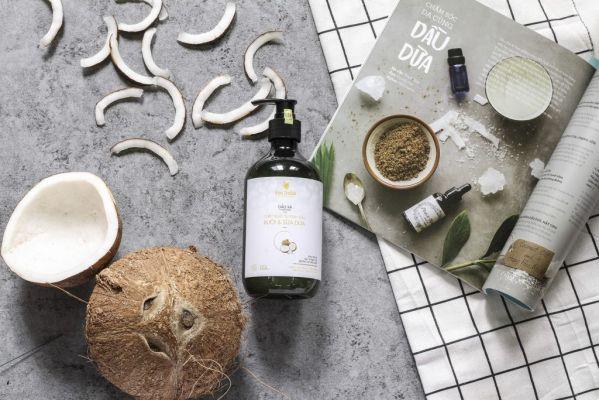
Coconut oil benefits in cosmetics
Another common use of coconut oil is in the production of cosmetics. On hair and skin this product has been used a lot, but how does it work? Find out now!
1) Presence of fatty acids
Coconut oil concentrates 90% of the fatty acids found in the fruit. These components are responsible for fighting premature aging, increasing skin elasticity and fighting microorganisms that can compromise skin health. On both the face and body, coconut oil can promote a sense of rejuvenation.
2) Fight inflammation
The anti-inflammatory action of coconut oil is widespread. It can be used to soothe minor inflammations and redness on the skin, but it should not be applied in large amounts. There are still not enough studies to prove that the anti-inflammatory action is efficient in all cases of inflammation. Watch out!
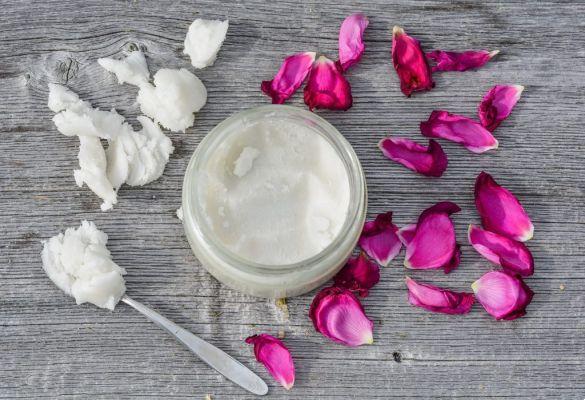
3) Hydration
The hydration potential of coconut oil is present on the skin of the face, body skin and hair. Applying the oil, even if it is mixed with other ingredients, is an effective way to make the application site softer and free from possible dryness. However, if your case is more serious, it is better to consult a dermatologist.
4) Exfoliating action
When a person decides to do a deep skin cleaning, every two months, for example, they should choose products that will not harm the skin when exfoliating. To reduce dead cells without causing micro-lesions on the skin, it is recommended to use coconut oil combined with a sandy product, such as almond, rice or oat flour.
5) Removal of impurities
Coconut oil can also be used as a makeup remover, especially for makeup that is waterproof and can only be removed with oily products. Ideally, you spread the product on your face with a cotton pad and then wash it off with warm water. Repeat the process until all traces of makeup have been removed.

Controversies over coconut oil
Although the benefits of the product are widely publicized, there is controversy about the effect that constant use of coconut oil can have on a person's skin and health.
In general, when only the benefits of a product are presented, many believe that there are no contraindications or precautions that must be taken to apply it. Therefore, it is necessary to go further and learn a little more about coconut oil.
One of the first warnings about the exacerbated use of coconut oil in food came in 2016, from the Spanish Society of Endocrinology and Metabology (SBEM) and the Spanish Association for the Study of Obesity and Metabolic Syndrome (ABESO). Many people use coconut oil for the purpose of losing weight, which was contraindicated by the statement prepared by the institutions:
“Whereas there is no evidence or physiological mechanism that coconut oil leads to weight loss; whereas the use of coconut oil can be deleterious for patients due to its high concentration of saturated fatty acids, such as lauric and myristic acids; SBEM and ABESO are directly opposed to the therapeutic use of coconut oil for weight loss purposes, considering that such conduct does not have scientific evidence of efficacy and presents potential risks to health. SBEM and ABESO also do not recommend regular use of coconut oil as a cooking oil, due to its high content of saturated and pro-inflammatory fats. Using vegetable oils with a higher content of unsaturated fats (such as soy, olive, canola and flaxseed) in moderation is preferable to reduce cardiovascular risk.”
The following year, the Associação Españaeira de Nutrologia affirmed that it condemned the use of coconut oil for the prevention or treatment of obesity and neurodegenerative diseases, stating that there is no clinical evidence that proves the effectiveness of this type of treatment.

From this, it is understood that coconut oil should be used sparingly, just like any other oil or fat. It will not be efficient to promote weight loss, since this purpose can only be achieved with responsible medical monitoring and periodically verified with clinical examinations.
Another problem pointed out in coconut oil is the presence of saturated fat in large amounts. While there are medium chain triglycerides, as pointed out earlier, most of the product's composition is saturated fat.
According to the American Cardiology Association, the saturated fat in coconut oil makes up 82% of the product. Foods such as butter, beef steak and pork loin present, respectively, 63%, 50% and 39% of saturated fat in their compositions.
While coconut oil has components that are beneficial for good cholesterol, it contains saturated fat, which increases bad cholesterol and can cause heart problems if consumed in excess.
This does not mean that consumption of coconut oil in small amounts is harmful to health. The benefits of the product can be obtained if it is consumed in moderation, in just one meal, weekly. Like any fat, you need to eat it with awareness.
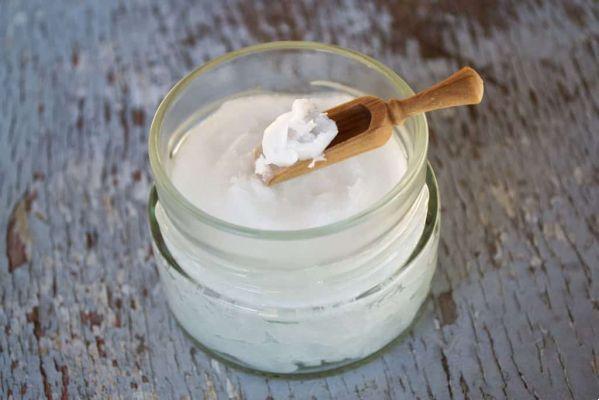
Regarding the skin, coconut oil also poses risks if used improperly. Although there is, among the fatty acids, lauric acid, responsible for fighting one of the bacteria that causes acne (Propionibacterium acnes), in the composition of coconut oil, there is another factor to be considered.
All people have pores, which promote skin breathing. If they are closed or clogged, the skin will not be able to breathe properly, making it unable to remove impurities. This can happen to your pores if you use products with comedogenic ingredients.
The level of harm that a product with comedogenic ingredients can cause is measured on a scale from zero to five. Coconut oil takes number four on this measure, being highly comedogenic and a possible greasiness and acne enhancer.
Increased oiliness can also be caused if coconut oil is applied routinely and for more than two hours to the hair shafts. It ends up suffocating the hair follicles, causing problems in the elimination of impurities that accumulate on the scalp. You have to use it carefully!
Before applying coconut oil directly to your skin or hair, either out of intuition or because someone recommended you do so, be aware that you need to consult a dermatologist first, to understand what your skin conditions are. and your scalp.
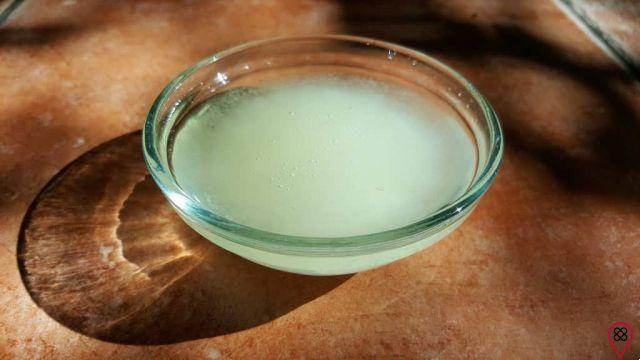
How to use coconut oil in cooking
In view of the health benefits and harms of coconut oil, it is possible to understand the best way to use it in the kitchen.
The most important part is regulating the amount of coconut oil you will use in your dishes and in your drinks. Instead of using this product daily, intersperse it with extra virgin olive oil or canola oil so that it is not consumed in large quantities throughout the day or week.
It is contraindicated that you feed on pure coconut oil, consuming it with a spoon, because it is a fat. As much as it causes a feeling of satiety, keep in mind that you are ingesting an oil that can be bad for your body, even if it is consumed in small amounts at every meal.
The best way to use coconut oil in the kitchen is in small amounts, in a few days, mixed with other foods or drinks. Thus, you do not create the habit of consuming it routinely and protect yourself against the harm it can cause in your body.

How to use coconut oil in cosmetics
For both skin and hair, coconut oil is recommended for cases where there is no oiliness. If your skin is dry, or if your hair is very dry, you can use coconut oil as we recommend.
If your skin is oily, or if your hair tends to be oily, consult a dermatologist before applying coconut oil. Otherwise, you can make your situation worse, leading to acne breakouts and hair loss.
You may also like
- Understand what characterizes oily skin and learn how to improve it
- Learn about the main benefits of coconut oil
- Use coconut oil as a cosmetic and feel the difference!
Use a quarter teaspoon of coconut oil to massage your face. It may seem like a small amount, but since it is an oil, it will spread easily on your skin. After ten minutes, remove all product using a clean cotton.
If your hair is dry, separate each strand and moisten them with coconut oil. Do not apply the product to the roots, only the lengths, as a conditioner. Massage each part of your hair and, after 20 minutes, shower. It is important that you remove all coconut oil from your hair.
Now that you know everything about coconut oil, always remember to consult a healthcare professional before starting any voluntary treatment for a condition that needs medical attention. Use coconut oil carefully and sparingly!

























